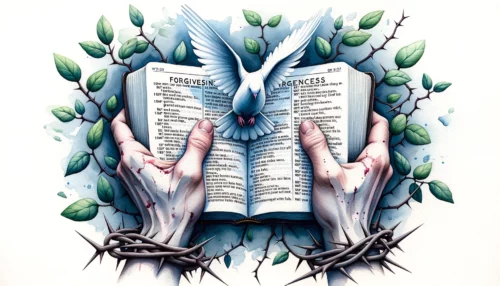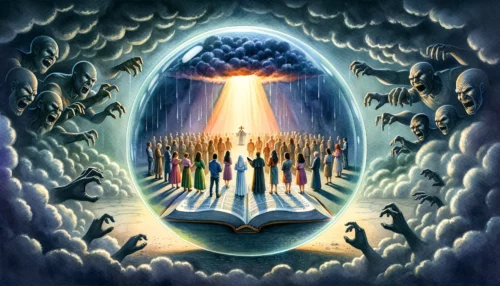The question of whether Christians should get insurance can sometimes spark contentious debates. On one side, some argue that insurance reflects a lack of faith in God’s provision, while others contend that insurance is a responsible approach to managing risks and protecting our families. This discussion seeks to provide an understanding of the matter, rooted in biblical principles and godly wisdom.
The Concept of Insurance and Biblical Stewardship
We are called to be good stewards of the resources God has entrusted to us. This means we should manage those resources in a way that is wise, thoughtful, and honours God. Insurance can be seen as a tool of stewardship, a means to responsibly manage risks and protect the resources God has given us.
Think of it like this: If you owned a house, you would likely do maintenance work to keep it in good condition, not because you don’t trust God to keep it standing, but because you understand that stewardship involves taking practical steps to protect and maintain what you have been given. This idea comes from the parable of the talents in the New Testament, where each servant is entrusted with resources and then evaluated on how they managed them (Matthew 25:14-30).
Insurance is a modern tool that can help us manage the resources and responsibilities God has given us. It can be a way to prepare for unforeseen events that could otherwise cause financial hardship for ourselves or others who depend on us. This is reminiscent of the teachings in Proverbs, which encourage us to consider the ant and its ways, storing up provisions for the future (Proverbs 6:6-8).
It’s essential to remember that while insurance can be a useful tool, it should never become a substitute for our trust in God. Nor should it be used irresponsibly or without careful consideration. Like any financial decision, the choice to purchase insurance should be made with prayer, wisdom, and a clear understanding of our motives.
Insurance, when used properly, aligns with the biblical concept of stewardship. It represents a practical means of managing God-given resources and responsibilities. It’s not a question of faith versus insurance, but rather understanding how insurance can serve as a tool of stewardship within a framework of trust in God’s provision and care. The decision to use this tool, like all decisions, should be guided by prayer, wisdom, and a heart set on honouring God.
Trust in God and the Role of Insurance
While insurance can be a tool of stewardship, it is crucial to understand that the ultimate source of our security and provision is God, not our insurance policies. Trust in God is a fundamental aspect of Christian faith. As believers, we’re reminded repeatedly throughout the scriptures that God is our protector, provider, and the one in whom we should place our ultimate trust (Psalms 46:1-3, Matthew 6:25-34).
Having insurance doesn’t negate our trust in God. Instead, it can be a testament to our understanding that God often works through practical means to provide for our needs. Just as God provides food but expects us to work to earn it, He provides for our needs but also expects us to use the tools available to us responsibly. We trust God for our daily bread, yet we go to work and buy groceries. Similarly, we trust God for protection, yet we can use insurance to mitigate risk.
However, there can be a temptation to shift our trust from God to our insurance policies, to rely on them as our primary source of security. This is a pitfall that Christians must consciously avoid. Our ultimate faith and trust must always remain in God, not in human institutions or mechanisms. We use insurance not as a replacement for God’s provision, but as a tool to manage potential risks responsibly.
Insurance can also be a way to love our neighbours. If our actions or unforeseen circumstances lead to harm or loss for others, insurance can help ensure that they are not left with a financial burden because of us. This aligns with the command to love our neighbours as ourselves (Mark 12:31).
When considering the role of insurance from a perspective of faith, it’s not about choosing between trusting God or having insurance. Rather, it’s about recognizing that God often works through natural means to provide for us, and that insurance can be one of those means. It’s about using the tools available to us responsibly, while keeping our ultimate trust in God and seeking to love and care for our neighbours. As we navigate these decisions, we must continually check our hearts to ensure our trust remains firmly rooted in God.
Applying Biblical Principles to Insurance Decisions
With an understanding of insurance as a tool of stewardship and a framework that keeps trust in God at the center, we can now explore how to apply these principles to insurance decisions.
The decision to purchase insurance should not be taken lightly or made out of fear, but rather after thoughtful consideration and prayer. It’s important to evaluate the risks we face, the potential impacts of those risks, and the ways insurance might help mitigate them. Just as the wise builder in Jesus’ parable considered the cost before starting construction (Luke 14:28), so too should we consider the cost and benefits of insurance.
While evaluating insurance options, it’s also essential to be aware of and avoid potential pitfalls. This includes the temptation to trust in insurance more than in God, or to use insurance irresponsibly, such as taking unnecessary risks because we know we’re covered. Each decision should be guided by the principles of trust in God, responsible stewardship, and love for our neighbour.
Another important factor to consider is the integrity of the insurance company. Christians are called to live justly and to do business with those who are honest (Proverbs 11:1). Therefore, it’s wise to research and choose an insurance company that operates with integrity and fairness.
We must remember that while insurance can help manage financial risks, there are many aspects of life it cannot safeguard. It can’t prevent accidents or illness, nor can it bring peace of mind or eternal security. These are things only God can provide. This underscores the need to keep our trust in God above all else.
Making insurance decisions as a Christian involves balancing practical considerations with our faith commitments. It means using insurance as a tool of stewardship while keeping our trust firmly in God. It involves thoughtfully considering our options, seeking to act responsibly and lovingly towards others, and choosing to do business with companies that reflect our values. Ultimately, it reminds us that while insurance can play a role in our financial planning, our true security is found in God alone.
Navigating Faith and Insurance
Through this journey, we’ve seen that insurance can be reconciled with Christian faith, serving as a tool of stewardship, while our ultimate trust remains in God. As you navigate your own decisions about insurance, consider these personal questions:
- How does my view of insurance reflect my understanding of stewardship and trust in God?
- What are the potential risks I face, and how might insurance help me manage them responsibly?
- In what ways can my approach to insurance reflect love for my neighbour and commitment to justice?
Let the spirit of wisdom guide you, just as it has guided believers throughout the ages. And remember, no matter what tools we use to navigate life’s uncertainties, our true security and peace are found not in policies or plans, but in the unfailing love and provision of God. Keep your trust in Him, for He is our surest and most enduring refuge.














